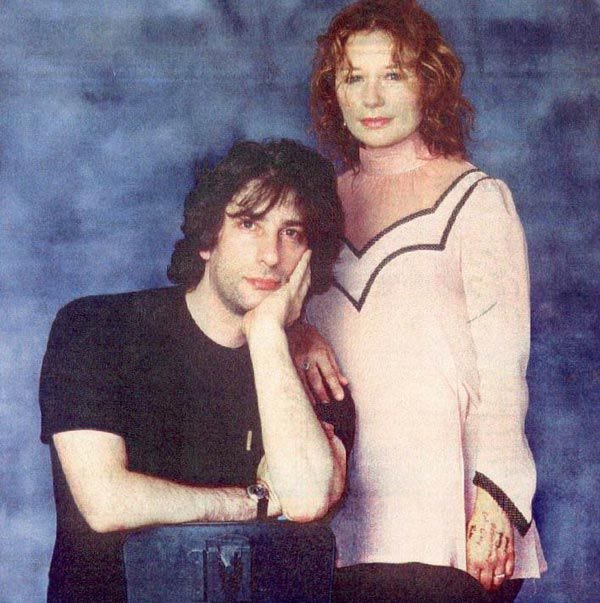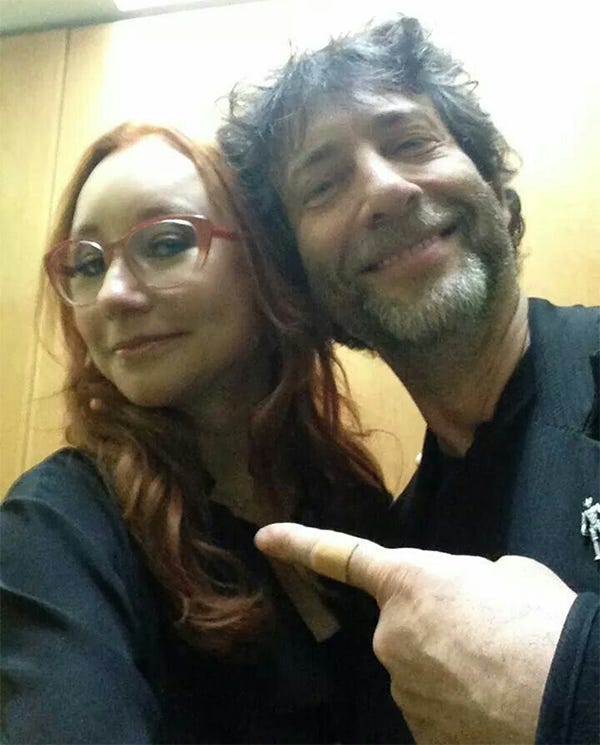No matter how rich and famous you are, no matter how much a young woman is impressed by your work or your station, you simply are not going to surmount your core behavioral patterns. Nor is your success going to make you very much more attractive to women, barring significant changes in your appearance and behavior. Which is why, instead of trying to become something you are not, or worse, trying to pass yourself off as something you’re not, you’re always better off focusing on becoming the best version of yourself that you can be.
There are some informative tidbits in Tori Amos’s account of her relationship with Neil Gaiman, who, if it isn’t abundantly clear at this point, is an apex Gamma male, which is to say a Gamma who enjoys situational Alpha status. As Gaiman does in certain creative and fandom circles.
In 1990 I had this friend, Rantz, and when he went to Parsons Art School in LA he crashed at my apartment for a while. It was this tiny single behind the Methodist Church on Highland Avenue. Rantz left a copy of Neil's book The Dolls House lying around. I picked it up, and found myself drawn to it over the next couple of weeks. Then I wrote this song called "Tear In Your Hand", which made reference to Neil, although it wasn't about him. I get inspired by different writers.
In January, 1991, I split to London, but Rantz had a tape of what I'd been doing, and he took it to a comic convention in San Diego to pass to Neil. He'd put my number on the tape. I had no idea, so when Neil called I was shocked. He said, "Are you thinking of doing this as something other than a hobby, because it's pretty good?" I said, "That's a relief, because Little Earthquakes is being released in a couple of weeks."
We met when Neil came to one of my early gigs at the Canal Brasserie in London. My first impression was that his Dream King character was an extension of himself, but even Neil's female characters are like extensions of himself with good silicon. We met at a time when celebrity hadn't made us guarded about people. Also, there was never any confusion that it was going to be a romance, and there's a sacredness to having a male friendship where that doesn't come into it. You can have a creative affair, though, and that can be tricky.
As thing started to get busier, Neil would fax me stories all over the world. I might wake up in Australia to a 50-page fax. He knows I have nightmares and I can't sleep sometimes, so he'll call and say, "Right, I'm going to read you a bedtime story." It'll be a horror story, of course, but in a strange way that appeals to me. It's like that saying: "If it's too loud, turn it up."
Amazingly, we've never fallen out, maybe because we get to pick and choose when we see each other. Neil's been there through all sorts of difficult things, though, and I hope I've been there for him. A few years ago I was going through a rough patch. It was on my Under The Pink tour, and my relationship was falling apart. I was on the rebound; in what I call 'vampire-chick state'. My incisors were sharp and I needed to drink.
I walked into my hotel room in Chicago and the phone was ringing. I answered it, and Neil goes, "Don't do what I think you're about to do." I said, "What in the world are you referring to?" He said "I feel you're about to make a move that'll lead to a downward spiral." I went ahead and did what I was going to anyway, but it amazed me that he knew. Sometimes you need someone to say, "You don't want to hear this, but..."
Neil and I don't just show up for the party, we live life together. His little girl is five now, and I'm one of her fairy godmothers. And Neil was there for me when I miscarried. He came to see me when he was writing Stardust, and he read me the first chapter on the beach. The wind was blowing and he held my hand. It was a time when very few words could bring comfort.
I think when you're at the crossroads there are some friends who just toddle off, and that's OK, because that's not their strength. Neil's different. He's never been shy about being at the crossroads.
It’s amusing how Amos makes her total lack of romantic interest in Gaiman very, very clear from the start. It’s very important for her to establish that he was never in her league and he never had a shot.
“There was never any confusion that it was going to be a romance.”
Indeed. Gaiman wasn’t going out of his way to support an exceptional talent, as he tries to imply when he says “The music was great and I thought, ‘I've got to ring her.’” Sure, Neil. It’s the music. Now, I don’t dislike Miss Amos’s music, but at no point would it ever have occurred to me that I had to ring her up. In fact, even though I am a professional recording artist and a member of two bands, I have never rung up a young woman because I thought her music was great.
It’s also amusing how Amos makes it clear that the song that made reference to Gaiman wasn’t about him. You know, just in case anyone missed her point that she was not, and is not, interested in him as a man. This is a simply brutal ex post facto and ongoing public rejection of a High-Socio, Low-Sexual-status man.
Remember this, “friend”. That great female friend of yours with whom you are so close and for whom you have carried a torch for years will unhesitatingly burn you to the ground in a nanosecond before she will let anyone believe that she has any romantic interest in you whatsoever. She’s not about to permit your great and very close friendship to interfere with her self-perspective on her attractiveness or harm her chances to get involved with higher SSH-status men than you.
As a writer, I think this next observation underlines Gaiman’s core mediocrity as a literary artist. Not only is he not a great writer, but despite his great success, he’s not even particularly good one.
“My first impression was that his Dream King character was an extension of himself, but even Neil's female characters are like extensions of himself with good silicon.”
This explains why his whole career depended upon him ripping off various stories from myths and legends. He’s just writing about his fantasy versions of himself from a myriad of perspectives. On the one hand, kudos to him for figuring out how to do it successfully and make a market for it over a period of decades; neither Jay McInerney nor Bret Easton Ellis, both better self-insert writers, ever managed to do the same. On the other, the similarly successful Larry Correia, whose self-insert as a giant firearms expert works perfectly in the context of his fiction, nevertheless managed to move beyond that sort of thing within a few novels. Gaiman never really did.
Gaiman’s account is intriguing for its typical Gamma passive-aggression. He’s clearly still a little salty about being friendzoned by Amos, as the first thing he has to say about her is that everyone thinks she’s crazy, and only he knows she isn’t. The psychological subtext, of course, being that everyone agrees with him and thinks she’s crazy for not being more interested in the Dream King himself, who appreciates her as no one else can. Notice how Gaiman presciently manages to try, and fail, to interfere with her going out and having an affair with another man of whom he does not approve, because that man is not him.
“Don't do what I think you're about to do. I feel you're about to make a move that'll lead to a downward spiral.”
That’s pure unadulterated Gamma in the friendzone talking. Don’t run off with that Alpha! He will be bad for you! Why won’t you just give me a shot!
In any event, it’s going to be interesting to see what, if anything, Tori Amos eventually has to say about the behavior of her “spiritual brother”. It won’t be terribly surprising if, like Gaiman’s ex-wife, she prefers to let her music do the talking for her.
And before the usual suspects attempt to jump in with their armchair psychologist theories about how I am just jealous of Gaiman’s proximity to Tori Amos, rest assured that even going all the way back to high school, I have never dated, hooked up, or had any form of romantic relations with any woman as unattractive as Miss Amos.
One last observation. Do you know what you find at the crossroads, Tori? Demons. You find demons at the crossroads.






That last photo of older Gaiman and Amos is fascinating. Only after SSH do I see so much more in photos. He tries to lean in because he thinks he's an alpha. She is leaning away so hard that she turns her head. And he subconsciously realizes this so he has to point to overcompensate. She's not even smiling.
I didn't realize Gaiman wrote Stardust but that makes sense now. I recall people saying the movie was similar to Princess Bride but I found that baffling, as Stadust's Tristan was certainly no Westley. The story is basically a simping manifesto:
-Loser villager declares his love for a woman out of his league, who is clearly not interested.
-He nags her until she agrees to go out with him in exchange for a fallen star, a promise she obviously considers delusional and has no intention of honoring.
-He finds the fallen star which turns out to be a hot babe.
-He brings the star back only to be rejected, but that's okay because "He just wants his love to be happy."
-Watching him get rejected inexplicably causes the star babe to fall in love with him.
-They have a chaste marriage (the star girl can't have kids) and he dies while she lives forever, happy to have known someone so "nice."
Yuck. I couldn't explain my revulsion when I first saw the film, but I realize why now. It might be the most gamma hero ever written.